Rachmaninoff and the Tsar
Hershey Felder (Book); Sergei Rachmaninoff (Music)
TheatreWorks Silicon Valley
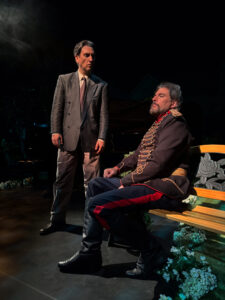
Little doubt but that there is a very real love affair between the San Francisco Bay Area and Hershey Felder. This is particularly true for the audiences of TheatreWorks Silicon Valley who have reveled in so many of his past musical biographies of famed composers like Tchaikovsky, Chopin, Beethoven, Debussy, and Gershwin to name a few. What is deemed as his last in this multi-decade series of personifying composers – Rachmaninoff and the Tsar now in a regional premiere at TheatreWorks – has “shattered” all pre-opening night, single-ticket sales for the fifty-plus-year old company, as announced last week.
For anyone who has had the privilege of seeing any of his past performances (or all, as have I) and/or for anyone who relished the many live streamed and filmed performances Hershey Felder created from his home in Florence, Italy during the two-plus years of the worldwide COVID pandemic (all to raise money for struggling theatre companies like TheatreWorks), it is easy to understand his popularity and the rush to grab a ticket for any chance to see him live. The remarkable aspect I find in Hershey Felder is that he is a phenomenal theatrical and musical treasure in at least three major categories.
First, Felder is a meticulous researcher and master storyteller as the playwright of the life stories of composers whose music is familiar to most but whose background details are a general mystery. Departing from his former solo performances in which he often depicts on stage both the title character and others important to that person’s life, Felder has penned the life of Sergei Rachmaninoff as a morphine-induced dream between the dying composer played by himself and the final Tsar of Russia, Nicolas II, played by Jonathan Silvestri.
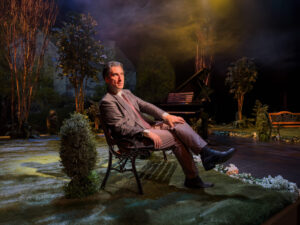
Having escaped Russia during the 1917 overthrow (and eventual murder) of the Tsar by the Bolsheviks, we hear how Rachmaninoff has spent his entire life searching for the Russia he so misses while also blaming the Tsar for allowing the demise of the mother country. So much did his escape to safety affect him – eventually leading him to settle in Beverly Hills, California and to become a U.S. citizen – that Rachmaninoff recounts how for much of his life, he suffered ‘writer’s block” and was forced to be “a touring monkey,” playing for adoring audiences the music of his earlier works or of other composers instead of composing more music himself. To the Tsar whom the sixty-eight-year-old has conjured in his drugged dreamworld in order to demand an apology, he confesses that since after the age of forty-four, “I could not compose for most of the rest of my life.”
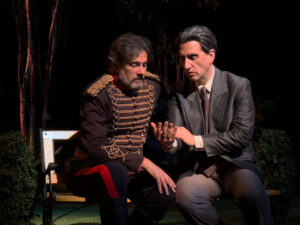
As the two interact, they jointly remember the joys of Russian church bells, the music of the earlier Sergei, and the faces of the loving children of the Tsar. The composer also hears firsthand the horrors of the final days and hours of the Tsar and his family and then recounts to the amazed and now-hopeful Tsar how Rachmaninoff did all he could to find, protect, and care for the one daughter – the Grand Duchess Anastasia – who supposedly escaped that fateful night when all her siblings and parents were brutally murdered. The story unfolds onstage like a lesson in history but also like a page-turner of a book full of intrigue, murder, and mystery.
But the telling works because Hershey Felder is also a talented actor who time and again has proven an uncanny ability to metamorphize into a believable historical character in manners, body stance, accent, and even native language that one could imagine defined the original composer. As Sergei, his eyes reach to the heavens in their aspiration as he admits, “Composing is when I come closest to God.” His sadness in relating the tragedies of his own life and their effects on his music (including periods of extended depression) is in great contrast to the sudden eruptions of volcanic anger he lashes at the Tsar – long, pent-up frustration how Nicholas II helped cause his own and Russia’s demise. All is all, the intriguing story Felder has conceptualized is the great Russian composer’s life-long search for the homeland he lost; his deep regret for the years of possible, new compositions that fizzled with little to show; and yet his ongoing drive to turn his keyboard into a celebration of nature and of his God.
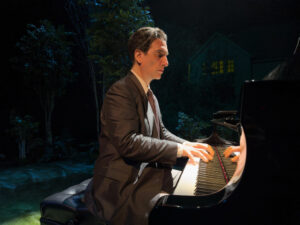
However, what has made and continues in this latest, performed chapter of a composer’s life to make a Hershey Felder performance a ‘do-not-miss’ opportunity is Felder as a piano virtuoso. Often even as he is relating a story, a feeling, or a regret of the portrayed Sergei, Felder goes to the waiting Steinway on stage and begins brilliantly and gloriously to play the commanding, haunting, and wonderfully familiar melodies of Rachmaninoff – excerpts from his concertos, symphonies, and Paganini Variations. It is in these moments that the biography gives way to a live concert that often I wished could last another hour of just Hershey Felder doing what maybe he does best – losing himself and us in the spectacular, rolling notes and chords of Sergei Rachmaninoff.
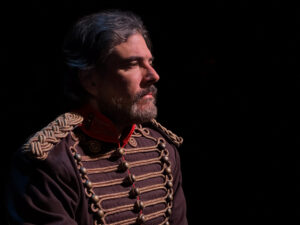
Noted Italian stage, film, and television actor, Jonathan Silvestri, joins Felder on stage as the last reigning Emperor of Russia, Tsar Nicolas II. While his role is clearly secondary, Silvestri does have singular moments where the pain of memory, the regret of past actions, and the clear love of Rachmaninoff’s music put the spotlight on his own abilities as an accomplished actor. His stiff, near-unbending posture; his gruff voice of Russian accent; and his deep-set eyes that often look searchingly for visions/people he can no longer see except in his memory all add to a memorable performance.
The memories of both Sergei and of the Tsar appear in both historical film clips and created sequences of the Tsar’s family (employing Silvestri’s own wife and daughter) projected on the background house that is a replica of Rachmaninoff’s Beverly Hills abode (one that still stands today) – all created by video designer Stefano Decarli. Hershey Felder himself is the production designer of the beautiful, amazingly realistic garden setting where the two Russians meet in the dying composer’s dream. Lighting by Erik S. Barry turns trees into emotional landscapes as moods change in the developing story on stage. As has been true in so many of Felder’s past live stage and now filmed creations, Trevor Hay directs with exacting yet highly sensitive and evocative touches.
Once again, Hershey Felder has awarded TheatreWorks Silicon Valley with a winner of a musical biography through his internationally famed abilities as playwright, actor, and composer. Rachmaninoff and the Tsar is a worthy final chapter in his biographical series of historically famous composers. For all of us who want more of Hershey Felder, luckily we can find many of his past and his newest creations ready to be streamed at www.hersheyfelder.net. I know where I will be going on nights when I am longing for some Felder-inspired entertainment.
Rating: 5 E, MUST-SEE
Rachmaninoff and the Tsar continues as a regional premiere by TheatreWorks Silicon Valley at the Mountain View Center for Performing Arts, 500 Castro Street, Mountain View California. Tickets are available online at www.theatreworks.org, by email at boxoffice@theatreworks.org, or by phone Tuesday – Sunday, noon to 6 p.m. at 1-877-662-TWSV (8978).
Photo Credits: Stefano DeCarli

Leave a Reply